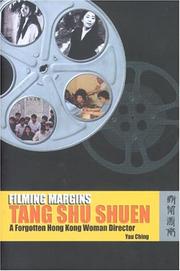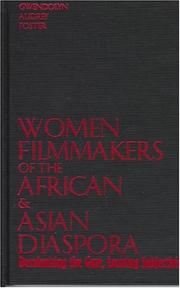| Listing 1 - 10 of 46 | << page >> |
Sort by
|
Book
ISBN: 3030709949 3030709930 Year: 2021 Publisher: Cham, Switzerland : Palgrave Macmillan,
Abstract | Keywords | Export | Availability | Bookmark
 Loading...
Loading...Choose an application
- Reference Manager
- EndNote
- RefWorks (Direct export to RefWorks)
Book
ISBN: 0861967445 0861969707 0861969715 Year: 2020 Publisher: New Barnet : John Libbey Publishing, Ltd.
Abstract | Keywords | Export | Availability | Bookmark
 Loading...
Loading...Choose an application
- Reference Manager
- EndNote
- RefWorks (Direct export to RefWorks)
"Mary Ellen Bute: Pioneer Animator captures the personal and professional life of Mary Ellen Bute (1906-1983) one of the first American filmmakers to create abstract animated films in 1934, also one of the first Americans to use the electronic image of the oscilloscope in films starting in 1949, and the first filmmaker to interpret James Joyce's literature for the screen, Passages from James Joyce's Finnegans Wake, a live-action film for which she won a Cannes Film Festival Prize in 1965." -- Amazon.com.
Experimental films --- Animated films --- Women motion picture producers and directors --- Bute, Mary Ellen. --- United States.
Book
ISBN: 191123918X 1911239171 184457914X 9781844579143 9781911239178 9781844579129 1844579123 9781844579112 1844579115 Year: 2019 Publisher: London ; New York : Bloomsbury on behalf of the British Film Institute,
Abstract | Keywords | Export | Availability | Bookmark
 Loading...
Loading...Choose an application
- Reference Manager
- EndNote
- RefWorks (Direct export to RefWorks)
"Sue Thornham explores issues of space, place, time and gender in feminist filmmaking through an examination of a wide range of films by contemporary women filmmakers, ranging from the avant-garde to mainstream Hollywood. Beginning from questions about space itself and the way it has been gendered, she asks how representation functions in relation to space and time, and how this, too, is gendered, before moving to an exploration of how such questions might be considered in relation to women's filmmaking. In sections dealing with spaces from wilderness to city, she analyses in detail how these issues have been dealt with by women filmmakers, addressing the work of filmmakers such as Jane Campion, Kathryn Bigelow, Julie Dash, Maggie Greenwald, Patricia Rozema and Carol Morley, and films including 'An Angel at My Table' (1990), 'Daughters of the Dust' (1991) 'The Ballad of Little Jo' (1993), 'Winter's Bone' (2010), 'Zero Dark Thirty' (2012) and 'The Falling' (2014)."--Bloomsbury publishing.
Book
ISBN: 1474495311 1474466974 Year: 2021 Publisher: Edinburgh : Edinburgh University Press,
Abstract | Keywords | Export | Availability | Bookmark
 Loading...
Loading...Choose an application
- Reference Manager
- EndNote
- RefWorks (Direct export to RefWorks)
Since the turn of the millennium, a growing number of female filmmakers have appropriated the aesthetics of horror for their films. In this book, Patricia Pisters investigates contemporary women directors such as Ngozi Onwurah, Claire Denis, Lucile Hadz̈ihalilović and Ana Lily Amirpour, who put 'a poetics of horror' to new use in their work, expanding the range of gendered and racialised perspectives in the horror genre. Exploring themes such as rage, trauma, sexuality, family ties and politics, 'New Blood in Contemporary Cinema' takes on avenging women, bloody vampires, lustful witches, scary mothers, terrifying offspring and female Frankensteins. By following a red trail of blood, the book illuminates a new generation of women directors who have enlarged the general scope and stretched the emotional spectrum of the genre.
Book
ISBN: 1282764888 9786612764882 1554581958 1554582717 9781554582716 9781554581955 1554581796 9781554581795 Year: 2010 Publisher: [Waterloo, Ont.] Wilfrid Laurier University Press
Abstract | Keywords | Export | Availability | Bookmark
 Loading...
Loading...Choose an application
- Reference Manager
- EndNote
- RefWorks (Direct export to RefWorks)
This book is the first major study of Canadian women filmmakers since the groundbreaking Gendering the Nation (1999). The Gendered Screen updates the subject with discussions of important filmmakers such as Deepa Mehta, Anne Wheeler, Mina Shum, Lynne Stopkewich, Léa Pool, and Patricia Rozema, whose careers have produced major bodies of work. It also introduces critical studies of newer filmmakers such as Andrea Dorfman and Sylvia Hamilton and new media video artists.Feminist scholars are re-examining the ways in which authorship, nationality, and gender interconnect. Contributors to this volume emphasize a diverse feminist study of film that is open, inclusive, and self-critical. Issues of hybridity and transnationality as well as race and sexual orientation challenge older forms of discourse on national cinema. Essays address the transnational filmmaker, the queer filmmaker, the feminist filmmaker, the documentarist, and the video artist--just some of the diverse identities of Canadian women filmmakers working in both commercial and art cinema today.
Nationalism in motion pictures. --- Lesbians in motion pictures. --- Women in motion pictures. --- Women motion picture producers and directors --- Feminist films --- History and criticism. --- Women Motion Picture Producers And Directors --- Women --- Motion Pictures --- Performing Arts --- Social Science
Book
ISBN: 0813587492 9780813587493 9780813587486 0813587484 9780813587479 0813587476 Year: 2019 Publisher: New Brunswick, New Jersey
Abstract | Keywords | Export | Availability | Bookmark
 Loading...
Loading...Choose an application
- Reference Manager
- EndNote
- RefWorks (Direct export to RefWorks)
Liberating Hollywood examines the professional experiences and creative output of women filmmakers during a unique moment in history when the social justice movements that defined the 1960s and 1970s challenged the enduring culture of sexism and racism in the U.S. film industry. Throughout the 1970s feminist reform efforts resulted in a noticeable rise in the number of women directors, yet at the same time the institutionalized sexism of Hollywood continued to create obstacles to closing the gender gap. Maya Montañez Smukler reveals that during this era there were an estimated sixteen women making independent and studio films: Penny Allen, Karen Arthur, Anne Bancroft, Joan Darling, Lee Grant, Barbara Loden, Elaine May, Barbara Peeters, Joan Rivers, Stephanie Rothman, Beverly Sebastian, Joan Micklin Silver, Joan Tewkesbury, Jane Wagner, Nancy Walker, and Claudia Weill. Drawing on interviews conducted by the author, Liberating Hollywood is the first study of women directors within the intersection of second wave feminism, civil rights legislation, and Hollywood to investigate the remarkable careers of these filmmakers during one of the most mythologized periods in American film history.

ISBN: 1283272059 9786613272058 1441159010 9781441159014 9781283272056 0826461018 9780826461018 0826470238 9780826470232 Year: 2002 Publisher: London New York Continuum
Abstract | Keywords | Export | Availability | Bookmark
 Loading...
Loading...Choose an application
- Reference Manager
- EndNote
- RefWorks (Direct export to RefWorks)
Leni Riefenstahl achieved fame as a dancer, actress, photographer, and director, but her entire career is colored by her association with the Nazi party. Appointed by Hitler, she directed the Nazi propaganda film Triumph des Willens along with her best-known work Olympia, a documentary of the 1936 Berlin Olympics. By 1939 Riefenstahl was arguably the most famous woman film director in the world; yet, after World War II, she was never again accepted as a filmmaker.Rainer Rother's book provides detailed coverage, from original documentation, of those aspects of Riefenstahl's career she herself h

ISBN: 1282704214 9786612704215 9882201326 9789882201323 9781282704213 6612704217 9622096891 9789622096899 Year: 2004 Publisher: Hong Kong Hong Kong University Press
Abstract | Keywords | Export | Availability | Bookmark
 Loading...
Loading...Choose an application
- Reference Manager
- EndNote
- RefWorks (Direct export to RefWorks)
This book studies the work of filmmaker Tang Shu Shuen in Hong Kong in the 1960s and 1970s. It raises issues regarding the applicability of paradigms of Western auteurism and feminist authorship in studying Tang's work and also examines the reasons why Tang Shu Shuen's work has been so underrecognised and underdiscussed historically.
Book
ISBN: 1839021152 1838710221 1839021160 9781839021152 9781839021169 9781844573639 Year: 2012 Publisher: London : Palgrave Macmillan on behalf of the British Film Institute,
Abstract | Keywords | Export | Availability | Bookmark
 Loading...
Loading...Choose an application
- Reference Manager
- EndNote
- RefWorks (Direct export to RefWorks)
"What happens when women tell their own stories in film? In What If I Had Been the Hero?, Sue Thornham addresses this question through an exploration of a wide range of films, from experimental feminist film to mainstream Hollywood, and from the 1970s to the present day, by film-makers including Sally Potter, Jane Campion, Deepa Mehta, Patricia Rozema and Lynne Ramsay. Her discussion takes in films from India and Argentina as well as Europe, Canada, Australia and the US."--Cover pages [4].

ISBN: 1299132499 0809380943 1441619356 9781441619358 9780809380947 080932119X 9780809321193 0809321203 9780809321209 Year: 1997 Publisher: Carbondale, Ill. Southern Illinois University Press
Abstract | Keywords | Export | Availability | Bookmark
 Loading...
Loading...Choose an application
- Reference Manager
- EndNote
- RefWorks (Direct export to RefWorks)
Black women filmmakers not only deserve an audience, Gwendolyn Audrey Foster asserts, but it is also imperative that their voices be heard as they struggle against Hollywood's constructions of spectatorship, ownership, and the creative and distribution aspects of filmmaking.Foster provides a voice for Black and Asian women in the first detailed examination of the works of six contemporary Black and Asian women filmmakers. She also includes a detailed introduction and a chapter entitled ""Other Voices,"" documenting the work of other Black and Asian filmmakers.Foster
Women motion picture producers and directors --- African American women motion picture producers and directors. --- Afro-American women motion picture producers and directors --- Women motion picture producers and directors, African American --- Women moving-picture producers and directors --- Motion picture producers and directors --- Women in the motion picture industry --- Women motion picture producers and directors. --- African American motion picture producers and directors. --- Asian American motion picture producers and directors. --- Motion picture producers and directors, Asian American --- Afro-American motion picture producers and directors --- Motion picture producers and directors, African American
| Listing 1 - 10 of 46 | << page >> |
Sort by
|

 Search
Search Feedback
Feedback About UniCat
About UniCat  Help
Help News
News